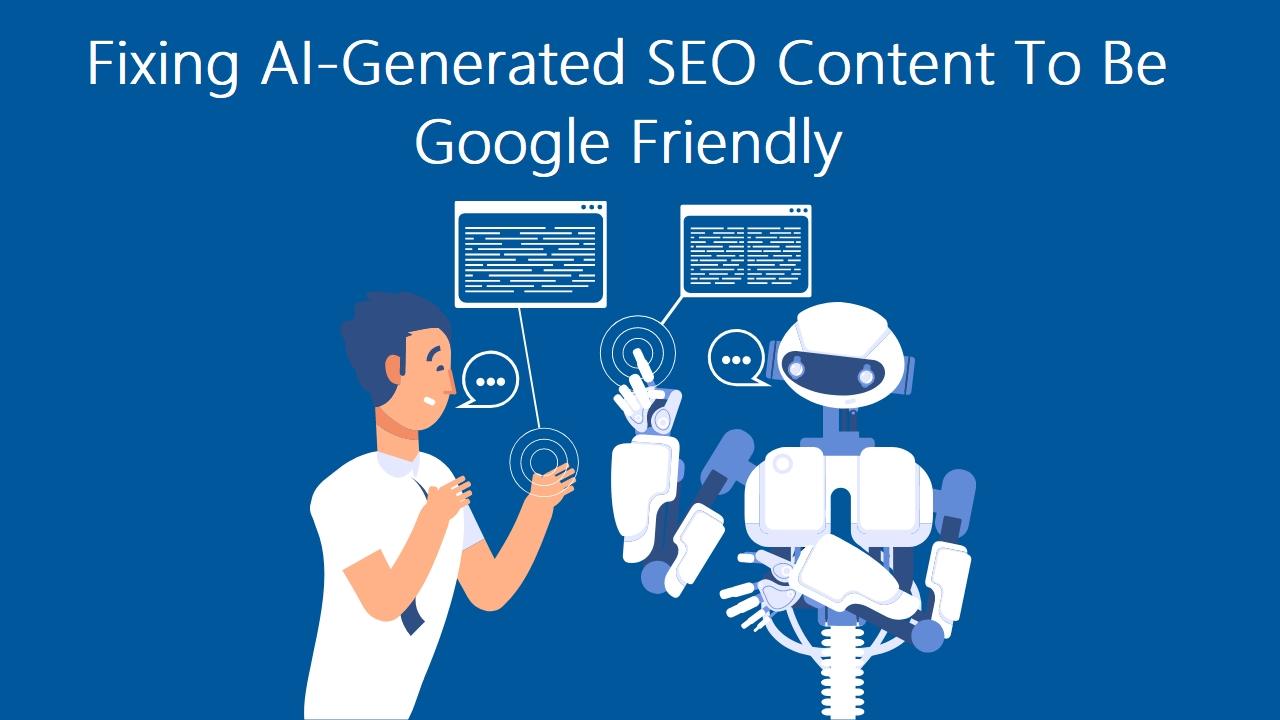
In this blog post, we’ll be discussing strategies for improving the quality and effectiveness of AI-generated SEO content. With the increasing use of AI in content creation, it’s important to understand how to fix AI-generated content to make it more Google-friendly.
We’ll start by discussing the challenges of Ai-generated SEO content. Then we’ll cover the importance of keyword research and how it can help you identify the terms and phrases that are most likely to be successful. Next, we’ll talk about the importance of incorporating these keywords into your content naturally and engagingly.
Finally, we’ll discuss the role of backlinks and other factors that help to improve the ranking of your AI-generated content on Google. By the end of this blog post, you’ll have a better understanding of how to fix AI-generated SEO content to make it more effective and more likely to rank on Google.
The Challenges of AI-Generated SEO Content
AI-generated SEO content can present several challenges, both in terms of its quality and its effectiveness. One of the biggest challenges is that AI-generated content may not always be well-written or engaging, making it difficult for readers to connect with it.
Additionally, AI-generated content may not always be optimized for search engines, meaning it may not rank well on Google and other search engines. This can make it difficult for readers to find the content, even if it is well-written and engaging.
“You’d be wrong to say that Google can’t detect AI content. It can. And I’m sure Google along with other tools such as Originality.ai are not only working to detect chatGPT or AI-generated content but also developing internal technologies to promote more helpful, and human-supervised content — rather than text copied and pasted from a bot”, says Jon Gillham, Founder of Originality.ai.
Another challenge is that AI-generated content may not always be unique, which can be a problem for search engines that value original content. Overall, the challenges of AI-generated SEO content can make it difficult for businesses to achieve the desired results from their content marketing efforts.
However, with a few strategies and tactics, AI-generated content can be a valuable asset to any business or writer. One of the key strategies for fixing AI-generated SEO content to be more Google-friendly is to conduct thorough keyword research. This involves identifying the terms and phrases that are most likely to be successful in terms of ranking on Google and other search engines. By incorporating these keywords into your content naturally and engagingly, you can improve the chances of your content ranking well on Google.
Another important strategy is to build backlinks to your content, as this can help to improve its ranking. Finally, it’s important to consider other ranking factors, such as the quality of your content, the user experience on your website, and the overall relevance of your content to your target audience. By implementing these strategies, you can improve the effectiveness of your AI-generated SEO content and make it more likely to rank well on Google.
In the next sections of this article, we will dive into all of these strategies to make AI-generated content Google-friendly. It will help you understand how to incorporate AI content into your marketing and content strategies.
Keyword Research
Keyword research is an essential part of fixing AI-generated SEO content to be more Google-friendly. This is because keywords play a critical role in determining how well your content will rank on Google and other search engines.
By conducting thorough keyword research, you can identify the terms and phrases that are most likely to be successful in terms of ranking well on Google. This can help you to incorporate these keywords into your content naturally and engagingly, improving the chances of your content ranking well on Google.
Additionally, keyword research can help you to better understand the needs and interests of your target audience, allowing you to create content that is more relevant and engaging for them.
Bram Jansen, Chief Editor of vpnAlert, says, “Keyword research is a crucial step in fixing AI-generated SEO content to make it more effective and more likely to rank well on Google, but you need to know how to find the right keywords.”
There are a number of ways to identify the most effective keywords for your content. One approach is to use keyword research tools, such as the Google Keyword Planner, which can help you to identify the keywords that are most popular and most likely to be successful in terms of ranking well on Google. These tools can provide you with data on the search volume and competition for specific keywords, allowing you to choose keywords that are likely to be effective for your content.
Another approach is to use keyword research techniques, such as keyword brainstorming and competitor analysis, to identify keywords that are relevant to your content and your target audience. By using a combination of these approaches, you can identify the most effective keywords for your content and incorporate them into your AI-generated SEO content in a way that will help it to rank well on Google.
Incorporating Keywords Into Your Content
Once you have identified the most effective keywords for your content, the next step is to incorporate them into your AI-generated SEO content in a natural and engaging way. This is an important step, as it can help to improve the chances of your content ranking well on Google and other search engines.
Correctly using keywords is important for several reasons. First, it can help to improve the readability and flow of your content, making it more enjoyable and engaging for readers. This is important, as readers are more likely to connect with and share content that is well-written and engaging.
Additionally, using keywords can help to improve the chances of your content ranking well on Google and other search engines.
Sean Stevens, Director of Immerse Education, says “Search engines value content that uses keywords in a way that is natural and relevant to the topic at hand.”
By adding keywords — the right way — you can improve the quality of your AI-generated content and make it more effective in terms of ranking well on Google. Here’s how:
Tips for Incorporating Keywords into Your AI-Generated Content
- Use keywords in the title and subheadings: By using keywords in the title and subheadings of your content, you can make it more likely to rank well on Google and other search engines. This is because search engines give extra weight to keywords that appear in these important locations.
- Use long-tail keywords: Long-tail keywords are more specific and less competitive than short-tail keywords. By using long-tail keywords in your content, you can improve its chances of ranking well on Google and other search engines.
- Use keywords in the first 100 words: By using keywords in the first 100 words of your content, you can make it more likely to rank well on Google. This is because search engines give extra weight to keywords that appear in the early part of the content.
- Use variations of your keywords: Instead of using the same keyword repeatedly, try using variations of your keywords to make your content more natural and engaging. This can also help to improve its chances of ranking well on Google.
- Use keywords in the meta description: The meta description is the snippet of text that appears below the title of your content in search engine results pages. By using keywords in the meta description, you can improve the chances of your content ranking well on Google.
Incorporating keywords into your AI-generated content is an important step in making it more effective and more likely to rank well on Google. By following the tips outlined above, such as using keywords in the title and subheadings, using long-tail keywords, and using variations of your keywords, you can improve the quality and effectiveness of your AI-generated content.
Additionally, using keywords in the first 100 words and the meta description can help to improve the chances of your content ranking well on Google and other search engines. By implementing these strategies, you can make your AI-generated content more effective and more likely to achieve your desired results.
Building Backlinks and Other Ranking Factors
In addition to incorporating keywords into your AI-generated content, there are other strategies you can use to improve its ranking on Google and other search engines.
Joshua George, Founder of ClickSlice, says, “One important strategy is to build backlinks to your content. Backlinks are links from other websites that point to your content, and they go a long way in creating content that Google likes.”
Backlinks play a critical role in improving the ranking of your AI-generated content on Google and other search engines. This is because search engines use backlinks as a key factor in determining the relevance and authority of a piece of content. When a website links to your content, it sends a signal to search engines that your content is valuable and worth ranking highly.
Additionally, backlinks can help to drive more traffic to your website, which can also improve your ranking on Google. In order to build backlinks to your AI-generated content, you can reach out to other websites and ask them to link to your content, or you can create content that is so valuable and engaging that other websites will want to link to it naturally. By building backlinks to your AI-generated content, you can improve your ranking and make it more effective in terms of achieving your goals.
In addition to backlinks, there are other factors that can impact the ranking of your content on Google. One important factor is the quality of your content. Google values high-quality content that is well-written, engaging, and relevant to the topic at hand. By creating high-quality AI-generated content, you can improve its chances of ranking well on Google.
Another factor is the user experience on your website. Google values websites that are easy to navigate and provide a good user experience. By improving the user experience on your website, you can improve the chances of your content ranking well on Google.
Finally, the relevance of your content to your target audience is also an important factor. Google values content that is relevant and useful to the people who are searching for it. By creating AI-generated content that is relevant to your target audience, you can improve its chances of ranking well on Google.
User Research to Improve AI-Generated Content
User research is the process of gathering data about your target audience to understand their needs, preferences, and behavior. This data can be used to improve the quality and effectiveness of AI-generated content by making it more relevant and engaging to your target audience.
User research can be conducted through a variety of methods, such as surveys, interviews, focus groups, and analysis of user data. However, the fastest and most cost-effective method is remote user testing. This method allows you to gain actionable feedback from your target users in a matter of minutes, not days or weeks. It also allows you to test a variety of resources like logo design, digital ads, and other major aspects of your branding or content strategies.
By conducting user research, you can gain valuable insights into your target audience, which can be used to improve the quality and effectiveness of your AI-generated content. This, in turn, can help to create content that is Google-friendly and puts you at the top of search results.
Ramunas Berkmanas, Digital Marketing Specialist at Ramberk, says, “If you want to publish content that beats competition and fools Google into ranking you at the #1 position, start from doing audience research. Because if you don’t understand your audience well enough, you can never create content that’s worthy enough to be ranked by Google”.
Conclusion
The key strategies for fixing AI-generated SEO content to be more effective and more likely to rank well on Google include:
- Conducting thorough keyword research to identify the most effective keywords for your content.
- Incorporating these keywords into your content in a natural and engaging way.
- Building backlinks to your content to improve its ranking on Google.
- Improving the quality of your content and the user experience on your website.
- Creating content that is relevant and useful to your target audience.
- Conducting user research to understand audience needs and expectations.
By implementing these strategies, you can improve the effectiveness of your AI-generated SEO content and make it more likely to rank in SERP results on Google.
If you’re using AI-generated content in your SEO efforts, it’s important to implement the strategies outlined above in order to improve its effectiveness and its chances of ranking well on Google.
By conducting thorough keyword research, incorporating keywords into your content the right way, building backlinks, and creating high-quality, relevant content, you can improve the chances of your AI-generated content ranking well on Google. We encourage you to implement these strategies and see the benefits for yourself.
Author
Asad Gill
Asad Gill is a serial entrepreneur who founded SEO Calling, a holdings company that owns: Provide top-rated SEO services, and product selling over 50 countries with #1 worldwide digital marketing consultancy firm. (Contact: [email protected]) (Skype: [email protected])





